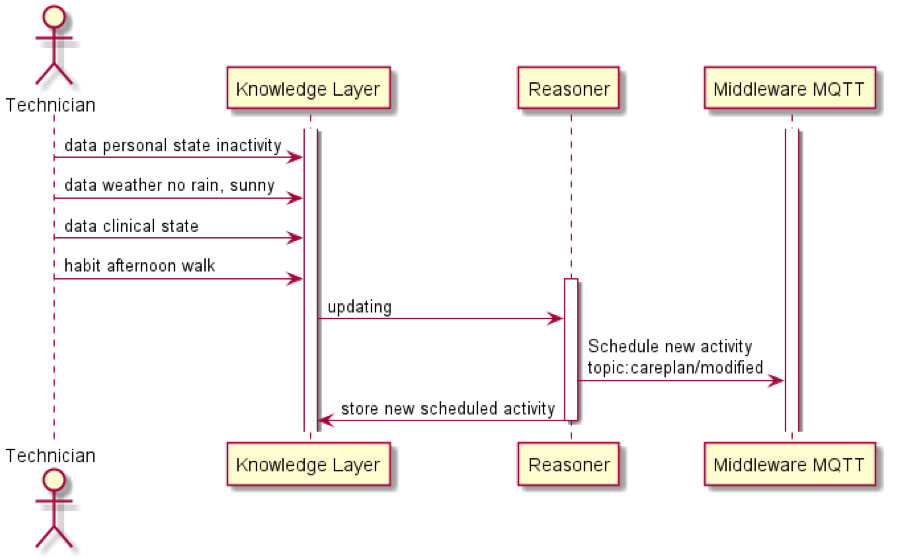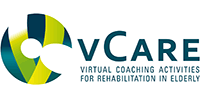The vCare Tech-Labs have been successfully completed!
vCare is focusing on four pathologies: Stroke, Parkinson’s disease, heart failure-and Ischemic heart disease. For each pathology, a clinical pathway and related activities and the modalities of interaction with the virtual coach have been defined by the clinical partners of the project.
The objective of the Tech labs was to verify that the technical components developed or made available by the technical partners were actually meeting the requirements previously validated. To achieve this result, the technical partners have developed a battery of tests. For each test, we have defined the preconditions to be met, the test execution modalities and the validation dimensions to be assessed. Those tests have been performed within the premises of the technical partners in Austria (AIT), Spain (MySphera) and Germany (FZI) but also involved SIVECO (Romania) and TUD (Germany). Due to the COVID-19 situation, partners have however been unable to travel to the different sites and the tests have been performed with the support of videoconferencing.
Each Tech lab tested an individualized setup in order to focus on specialized parts of the vCare system. While Germany’s tech-lab performed extensive experiments for AI-based clinical pathway adaptation, the technical sight in Austria dealt with intelligent end-user interaction and Spain’s premise tested the overall system integration. As a consequence, each Tech lab followed the concept of semi-integrated testing, where required vCare sub-systems were evaluated in terms of data flow and business logic. A semi-integrated test refers to an experiment for a particular sub-system, where data is partially simulated or collected offline to the extent that the sub-system can be confidently validated.
The Tech-Lab Germany as an example
For testing the vCare knowledge layer and its capabilities to recommend personalized activities for individual patients, the tech-lab Germany conducted experiments to (i) automatically gather all relevant information for decision-making (e.g. the patient’s current care plan, the development of her/his vital parameters over time or her/his clinical history), (ii) exploit a curated corpus of expert rules to adapt the care plan according to clinical guidelines and medical expertise and (iii) perform AI-based care plan adaptation based on advances reinforcement learning algorithms.
vCare relies on a study design which involves clinicians and end-users at each stage of its development. During this phase, the medical partners have been invited to submit their comments and impressions during and after the tests. The resulting discussions disclosed the need to make central data processing- and decision-making tasks sufficiently transparent and did yield a shared understanding of the vCare system. An exemplary result are advanced dashboards, which visualize the used input data for pathway adaptation, which are continuously improved during the living-lab phase.
Here, the focus was also on information processing. While the test implementation concentrated on the exchange of simulated data via the defined interfaces, the regular discussions with the medical partners allowed additional knowledge about the processing of more extensive data from a medical perspective and the modalities of interaction with patients to be integrated. As central result, vCare has compiled a comprehensive test summary report for both functional and non-functional requirements. All individual integrated as well as semi-integrated test cases were conclusive, showing that required technical interfaces between layers and components are available and functional.
Here is a detailed example of how a specific requirement has been tested in one of the Tech-Lab:
| Services: CS5 Rehabilitation coach | Requirement: R4-6 Personalized and context-aware interaction and feedback |
| Context:
The VC, considering the daily state of physical inactivity of the user protracted for a long time (personal state), considering the good weather (environment profile), considering the user’s compliance (personal state & historical information), considering the user’s health status (clinical state), and considering the reconstruction of his afternoon habits (clinical pathway profile), proposes a physical activity among those available in the clinical pathway (activity profile & clinical pathway profile): a walk outside in the open air at a pace of 5km/h for 30 minutes.
Test: – The technician verifies that the system stores the information of “High level of user inactivity”, “favourable weather forecast”, “usual walk outside” and “adequate clinical state”. – The technician checks the logfiles to verify that IF high level of user inactivity AND favourable weather forecast AND usual walk outside AND adequate clinical state, THEN the VC proposes the coaching for an active lifestyle activity: “walking outdoor at 6km/h for 30 minutes” |
Test setup – precondition:
- Technical partners generate exemplary clinical state attributes of a patient
- Integration tests on processing the state attributes of a patient
- Simulated knowledge input about the weather and habits inserted to the knowledge layers RDF-store
- Integrated tests on proposing activity

A number of adjustments and more detailed specifications were during the TechLab in dicsusion with the medical partners:
For example, we had to precise what “favourable weather forecast” could concretely mean. And the answer has been:
- NO RAIN
- NO ICE
- NO FOGG (to avoid visibility problems)
- NO dark hours (1 hour after sunrise and 1 hour before sunset) (to avoid visibility problems)
- temperature < 30°C
The “adequate clinical state” is defined by the objective- and subjective assessments of a patient’s physical health and fitness. In this case, walking can be proposed:
IF hip, knee and ankle conditions are either medium or high (freedom of movement)
AND Balance skills level is acceptable
AND the level of perceived exertion is either medium or low.
Test execution:
- Integration test: messages holding information about different clinical state parameters are processes via the MQTT broker properly and are stored in the knowledge layer
- Trigger: receiving messages about a patient inactivity via MQTT broker. Message to the topic of “vcare/<patientid>/observation”
- Reasoner: automatically checks if all conditions are met.
- Proposes walking for 30 min at a pace of 6 km/h as a new scheduled activity to the broker
Test validation:
- The reasoner compares the current state of the patient received by the MQTT broker to the threshold values defined by our medical partners
- The reasoner generates a new scheduled activity as defined in the vCare ontology and provides this information to the topic of the patient’s individual care plan
Comment medical partners:
| Input summary | Output summary | Comment (Medical Partners) |
| to test this use case, we simulate a patient and store information about a simulated agenda in our knowledge graph. We also insert information about the patients habit of walking outside, that would be extracted as a pattern in the long run. | VC proposes the coaching for an active
lifestyle activity: “walking outdoor at 6km/h for 30 minutes” |
For a first test this condition is correct. Complex conditions defined in TechLab to be continued. |
Test summary:
To complete this test, it proved necessary to define the extensive specification of the mentioned input conditions. Through interactions with the medical experts, it was possible to define not only the requirements for this exact use case, but also the basic rules that are used for suggesting activities in our Smart Agent.
In addition to these content-related achievements, we were also able to test and validate the integration of the relevant components. Both the recording of clinical conditions of the patient and the provision of information about a new planned activity could be achieved in cooperation with the respective technical partners.
vCare is now ready for the Living-Labs !
The report also describes the progress in the technical integration of the technical vCare components and how the medical knowledge has been concretely integrated into the technical components of vCare. All technical interfaces are now fully defined and implemented: Data and information flow is now possible throughout the vCare system.
Now that those tests have been successfully fulfilled, vCare can begin the Living labs phase: The vCare system will be tested in a controlled environment by real patients and feedback will be collected in a structured and continuous way. This will result in the identification of gaps and/or to the adaptation of requirements which will then will need to be again tested. In order to ensure efficient and fruitful Living lab experiments, both medical- and technical vCare experts will be available to observe and interact with the participating patients.
